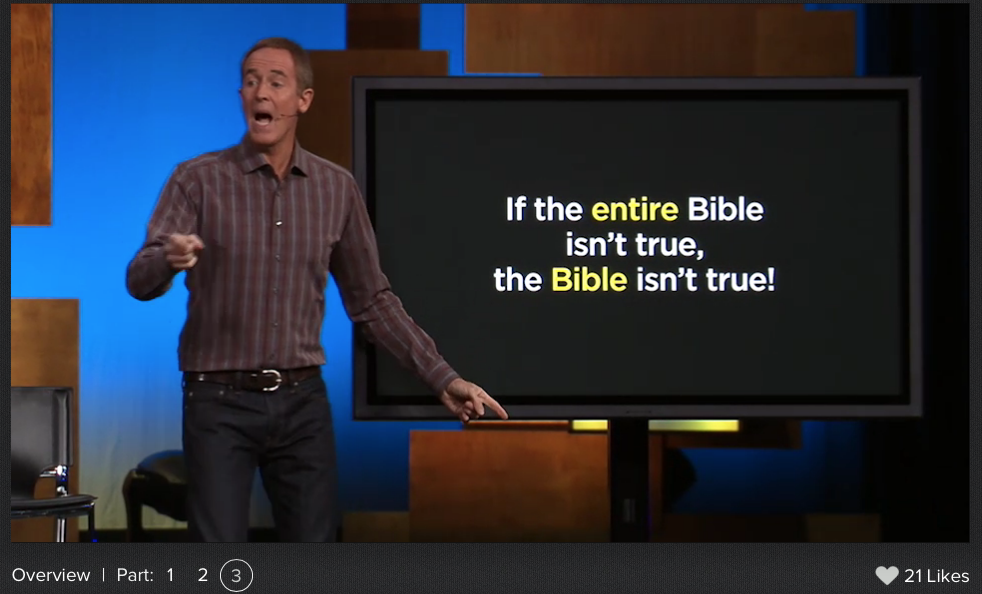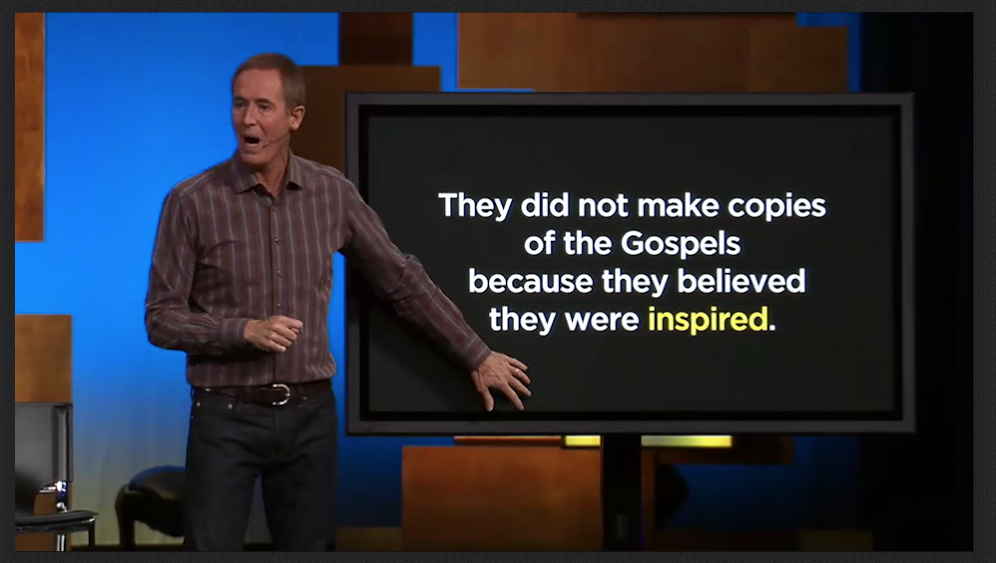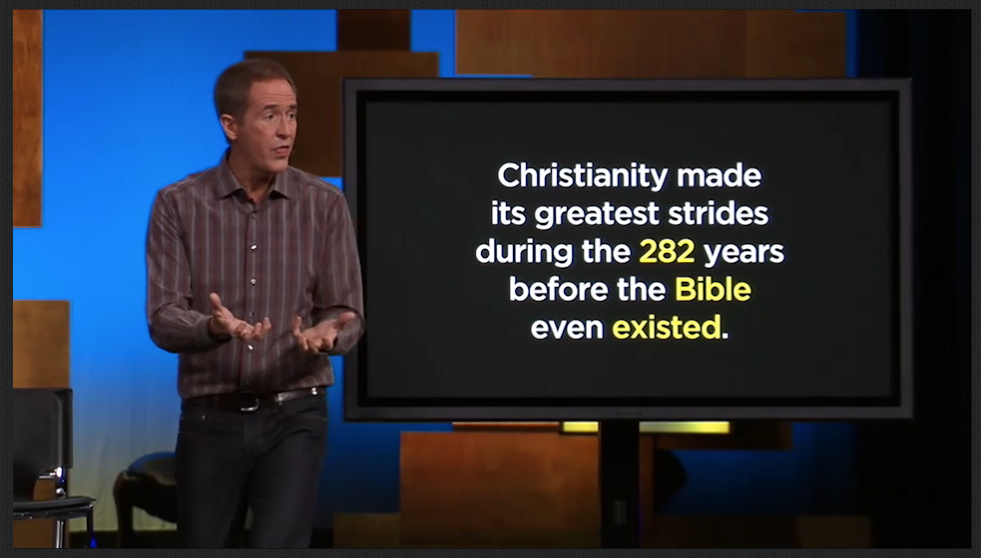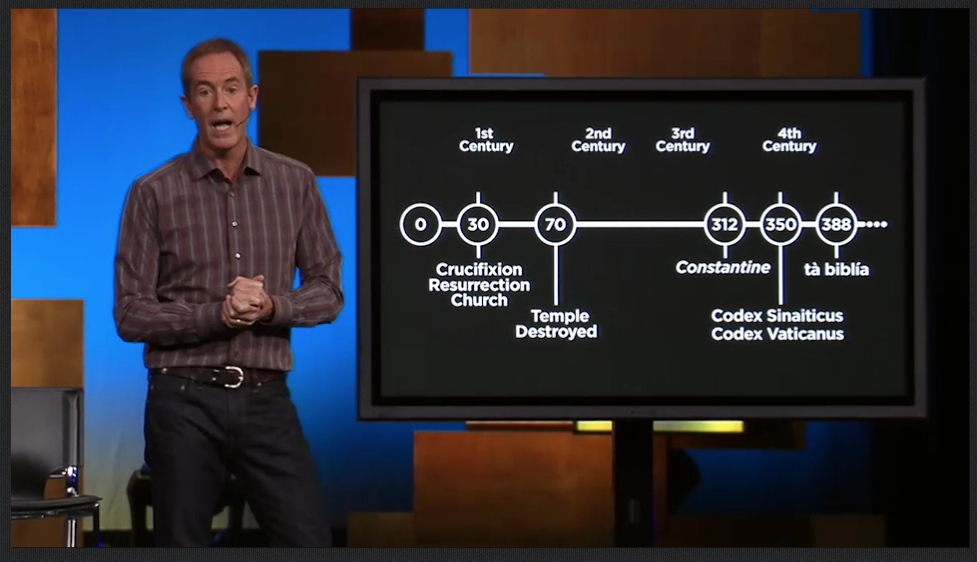Presume for a moment that you haven’t read the title of this article. See if, from these selected quotes from some 2,000 years of Christian orthodoxy, you can identify the errant claim, the one which stands clearly outside the scope of that orthodoxy.
“Look carefully into the Scriptures, which are the true utterances of the Holy Spirit.”
Clement of Rome
“Read again and again the divine Scriptures; nay, let the Holy Book never be out of your hands. Learn, that you may teach.” Jerome
“We must surrender ourselves to the authority of Holy Scripture, for it can neither mislead nor be misled.” Augustine
“Scripture is the Holy Spirit’s school where everything we need to know is taught and where nothing is taught that is unnecessary.” John Calvin
“Indeed, since the entirety of Scripture is the Word of the Lord, no testimony could possibly be better, more certain or more efficacious. For if God, who cannot lie, has spoken something in His own Scripture, which is itself the mirror of His will, then it is true.” John Wycliffe
“Let us receive nothing, believe nothing, follow nothing which is not in the Bible, nor can be proved by the Bible.” J.C. Ryle
“If we once get above our Bibles and cease making the written Word of God our sole rule as to faith and practice, we shall too lie open to all manner of delusion and be in great danger of making shipwreck of faith and a good conscience.” George Whitfield
“The Bible is the Word of God in such a way that when the Bible speaks, God speaks.” B.B. Warfield
“We must stress that the basis for our faith is neither experience nor emotion but truth as God has given it in verbalized, propositional form in the Scripture and which we first apprehend with our minds.” Francis Schaeffer
“There is not better book with which to defend the Bible than the Bible itself.” D.L. Moody
“There is no substitute for submission to Scripture. Your spiritual health depends on placing the utmost value on the Word of God and obeying it with an eager heart.” John MacArthur
“Our spiritual maturity will never exceed our knowledge of the Bible.” Albert Mohler
“Submission to the Scriptures is submission to God. Rebellion against the Scriptures is rebellion against God.” Kevin DeYoung
“It is next to impossible to defend the entire Bible.” Andy Stanley
Andy Stanley’s “sermon” – actually he called it a “conversation” – this past Sunday morning at his megachurch, Northpoint Community Church in Atlanta, comes on the heels of the outrageous commentary he offered merely a few days earlier at a Southern Baptist Conference hosted by Russell Moore and the Ethics And Religious Liberty Commission.
The highlight of his attack on God’s Word at that event came in response to the “what if you were the evangelical pope” query posited by Russell Moore. The zenith moment of Stanley’s response came in this uttered reply,
“I would ask preachers and pastors and student pastors in their communications to get the spotlight off the Bible and back on the resurrection.” Andy Stanley (Emphasis added)
Stanley proceeded to give a brief, theologically noxious outline for how he’d reprint the Bible so that unbelievers would find it more palatable.
“I might republish all the Bibles and call the first half ‘God’s covenant with ancient Israel’ and the second half ‘God’s covenant with the world’ because the way we talk about the Scripture is confusing for unchurched people.” Andy Stanley
As though these two statements couldn’t be topped for their exacting attack on God’s Word, Stanley exceeded them in his “conversation” with Northpoint.
“It is next to impossible to defend the entire Bible.” Andy Stanley
A link to the entire Stanley conversation is provided at the close of this article.
 The premise of his graphic intense chat with whatever sheep may have been among the goats at Northpoint was that the Sunday School tune many folks grew up with is wrong. It’s false, and dangerous for thinking, intellectual, college-educated adults to believe, because it might just prompt them to become “de-converted.”
The premise of his graphic intense chat with whatever sheep may have been among the goats at Northpoint was that the Sunday School tune many folks grew up with is wrong. It’s false, and dangerous for thinking, intellectual, college-educated adults to believe, because it might just prompt them to become “de-converted.”
“Jesus loves me this I know, for the Bible tells me so … This is where our trouble begins.” Andy Stanley
From this opening statement, Stanley goes on to weave a detailed story about what ought not be a Christian emphasis on Scripture, noting that such things as the fall of Jericho, Noah’s flood, and the exodus of Israel from Egypt cannot be verified, have not been confirmed by archaeology, and are spurious examples of stories in the Bible that conflict with what “everyone knows,” a knowledge acquired, of course, from secular education. He goes on to confirm the prevalent scientific “fact” that “everybody knows the earth is 4 or 4.55 billion years old … the universe is 14.5 billion years old.”
“If the Bible isn’t true, Christianity comes tumbling down. Consequently, Christians have felt compelled to defend the Bible because the only way to defend the Christian faith is to defend the Bible. It is next to impossible to defend the entire Bible.” Andy Stanley
Stanley’s ambition is nothing less than to destroy the credibility of Scripture. But in so destroying Scripture, Stanley aims to nevertheless justify the truth of Christianity as a faith that doesn’t need God’s Word as the singular guide for faith and practice that 2,000 years of orthodoxy has proclaimed. For him, there is no providential inspiration, protection, and delivery of God’s self-revelation to man. The Bible has errors but we can still have faith in Jesus. (Of course you can, Andy. It’s just a different Jesus from a different gospel that will found to be faulty that first moment one adhering to it takes an after death breath.)
Pointing his audience to his onstage flat screen, Stanley gives his history lesson of Christianity and the Bible, emphasizing that the Bible we have didn’t come into existence until some 350 years after the birth of Christ. He’s referring to the approximate dating of the compilation of the Old Testament and the New Testament canons as discovered intact and complete in what are known as the Codex Sinaiticus and Codex Vaticanus.
While these are, correctly, the oldest extant copies of both testaments, they are merely the earliest compilations of those testaments in a single place. But, as scholarship has affirmed, the providence of God has kept intact over 25,000 individual manuscript copies of the books of the New Testament, copies that date back to the beginning of the second century. Those, aggregately, give us a 99.9% accurate capture of the original autographs that were completed prior to the end of the first century.
“The vast array of manuscripts has enabled textual scholars to accurately reconstruct the original text with more than 99.9 percent accuracy.” A.T. Robertson
(For further explanations on the amazing world of ancient Biblical manuscript academics, and the authority with which we can deem current Scriptures to be effectively error-free, consider Michael J. Kruger’s works The Question of Canon, and Canon Revisited; and, F.F. Bruce’s classic text, The Canon of Scripture. For consideration of Scripture’s uniqueness among all other books, B.B. Warfield’s The Inspiration and Authority of The Bible is unmatched.)
Defending the Bible, while a two thousand year endeavor at this point for the rest of Christendom, is for Stanley a fruitless task. For him, it is unnecessary for the Bible to be without error. In fact, while proclaiming it to be certainly in error – despite his own church’s statement on Scripture’s authority – Stanley is trying to deny God’s Word in order to justify his erroneous “Jesus loves everybody” claim to unbelievers. In his twisted theology, it’s not necessary for you to know that Jesus loves you because the Bible tells you so. Jesus loves you because the resurrection tells you so, a resurrection which, of course, is proclaimed in the Gospel and revealed in the Bible.

Now, lest you go completely slack-jawed with the apparent lunacy of his argument, understand what Stanley does. He denies the infallibility of Scripture as the source for the Christian faith and, instead, points to the resurrection as the foundation for the Christian faith. It’s nothing short of a mind so entrenched in modernism that God can raise His Son from the dead but somehow lacks the omnipotent wherewithal to deliver to His creation an undefiled Word.
Certainly, the apostle Paul’s ambition was to know nothing but Christ and him crucified. (1 Corinthians 2:2) Christ’s resurrection is the capstone of the Gospel, delivered providentially to us in Scripture. But where does Stanley turn for theologically explanatory information regarding the resurrection? He doesn’t turn to the available extra-biblical sources that are in existence that speak to Christ’s resurrection. Instead, he turns back to the New Testament writers themselves.
 Stanley’s intent is to appeal to unbelievers who have difficulty – as every unregenerate soul does – in grasping, not only the meaning of Scripture, but also its internal consistency. Far from the self-contradicting errors Stanley attributes to God’s Word, believers realize, with the illuminating aid of the Holy Spirit, that Scripture provides a cohesive, inspired self-revelation of God.
Stanley’s intent is to appeal to unbelievers who have difficulty – as every unregenerate soul does – in grasping, not only the meaning of Scripture, but also its internal consistency. Far from the self-contradicting errors Stanley attributes to God’s Word, believers realize, with the illuminating aid of the Holy Spirit, that Scripture provides a cohesive, inspired self-revelation of God.
The superficial circular logic of denying Scripture’s infallibility only to point back to Scripture as the source of information to justify the love of Jesus – because His resurrection proves it – is patently preposterous. Consider his words below:
“For the first 300 years, the debate centered on an event, not a book. The question was not, is the Bible true, is the Bible true, is the Bible true? The question was, Did Jesus rise from the dead? … and Matthew said He did, and Mark said He did, and Luke said He did, and John said He did, and Peter said He did, and James the brother of Jesus said He did, and the apostle Paul, who hated Christians, eventually came to the conclusion … Jesus rose from the dead.” Andy Stanley
While Paul’s realization of the truth of the resurrection was far more than the “eventual conclusion” Stanley attributes it to be, what Stanley does is deny Scripture to turn right around and point to authors of the New Testament as the sound sources of authenticating the resurrection story. Presumably for Stanley, the Old Testament is error-ridden, while the New is more credible.
 Stanley’s point is accurate only with regards to the complete corpus of the canon. However, the component letters and books that constitute the complete corpus were vastly circulated throughout the early church, well back into the first century. Paul’s writings include commands to share them with churches in neighboring towns. Peter was well aware of the writings of Paul and cited them in his own epistles.
Stanley’s point is accurate only with regards to the complete corpus of the canon. However, the component letters and books that constitute the complete corpus were vastly circulated throughout the early church, well back into the first century. Paul’s writings include commands to share them with churches in neighboring towns. Peter was well aware of the writings of Paul and cited them in his own epistles.
The effort to destroy Scripture, which Stanley clearly believes to contains errors – the Jericho story, the flood story, the exodus, the age of the earth implied by it – is nothing less than what was seen early on in the target of Stanley’s destruction. Eve encountered another created being who challenged the veracity of God’s Word. On Sunday at Northpoint in Atlanta, many more were exposed to the very same sort of attack.
Stanley’s motivation – beyond the evident appeal to pump up his intellectual provenance before what must be a predominately unbelieving crowd (After all, how many true believers would tolerate such attacks on God’s Word?) – is perhaps merely the fundamental erroneous Gospel that Stanley promotes. The false and damning “Jesus loves you and has a wonderful plan for your life” gospel needs no Scriptural foundation. Indeed, if you’re hurling that nonsense at folks, you don’t really want them to get too familiar with Scripture, because it will eventually out you.
Andy Stanley, a man who has more faith in modern “truth” than in the Truth of Scripture, wants people to believe that Jesus loves them, not because the Bible tells them so, but because the resurrection does. Yet the Jesus he promotes – with a false, all you need is love message, by the way – is not the Jesus of Scripture, who authored Scripture, and inspired Scripture. It cannot be the same Jesus because Andy Stanley accepts, and proclaims from his pulpit-less platform, that Scripture contains errors.
But the Jesus of Christian faith, revealed in Christian Scriptures, is God. He is error-free and He believed in error-free Scripture, which, for Him, was the Old Testament. Stanley would do well to revisit the Emmaus road account wherein our risen Savior appeared and illuminated those Scriptures. “And beginning with Moses and all the Prophets, he interpreted to them in all the Scriptures the things concerning himself.” (Luke 24:27)
In order to prop up his false, almost sounds right, “Jesus,” Stanley has no option but to deny the integrity of Scripture, Scripture in which the true Jesus remarked authoritatively about His Written Word. “Not one jot or tittle.” (Matthew 5:18) Stanley’s chagrin for Scripture aside, we can rest assured in the truth written by the author of Hebrews, “in these last days he has spoken to us by his Son. (Hebrews 1:1) And that Son? Yes, He is the Word. (John 1:1) And the Word speaks to us today … exclusively in His Word.
If we reach back some 500 years in Christian orthodoxy, we find the words of another defender of Scripture, not included in the opening list of quotations. The words he proffered seem particularly apropos to Andy Stanley and the ilk who would defend him in his destructive tirade against the revealed Word of God.
“Whom God intends to destroy, He gives them leave to play with Scripture.” Martin Luther
The prudent will avoid them.
[evp_embed_video url=”https://archive.org/download/PPStanley/P&P_Stanley.mp4″]
See Andy Stanley’s entire Sunday morning “conversation” HERE.
Be sure to go here and like our Facebook page.

[Contributed by Bud Ahlheim]
See Also:
- Andy Stanley Trashes Expository Preaching; Calls it “Easy” and “Cheating”
- Andy Stanley: Even if you don’t believe that Jesus is the Son of God, you will have a better life by following his teachings
- SBC Conference: “Get The Spotlight Off The Bible” (Courtesy of Russell Moore & Andy Stanley)
- Andy Stanley: “We’re On The Subway To Hell…”











